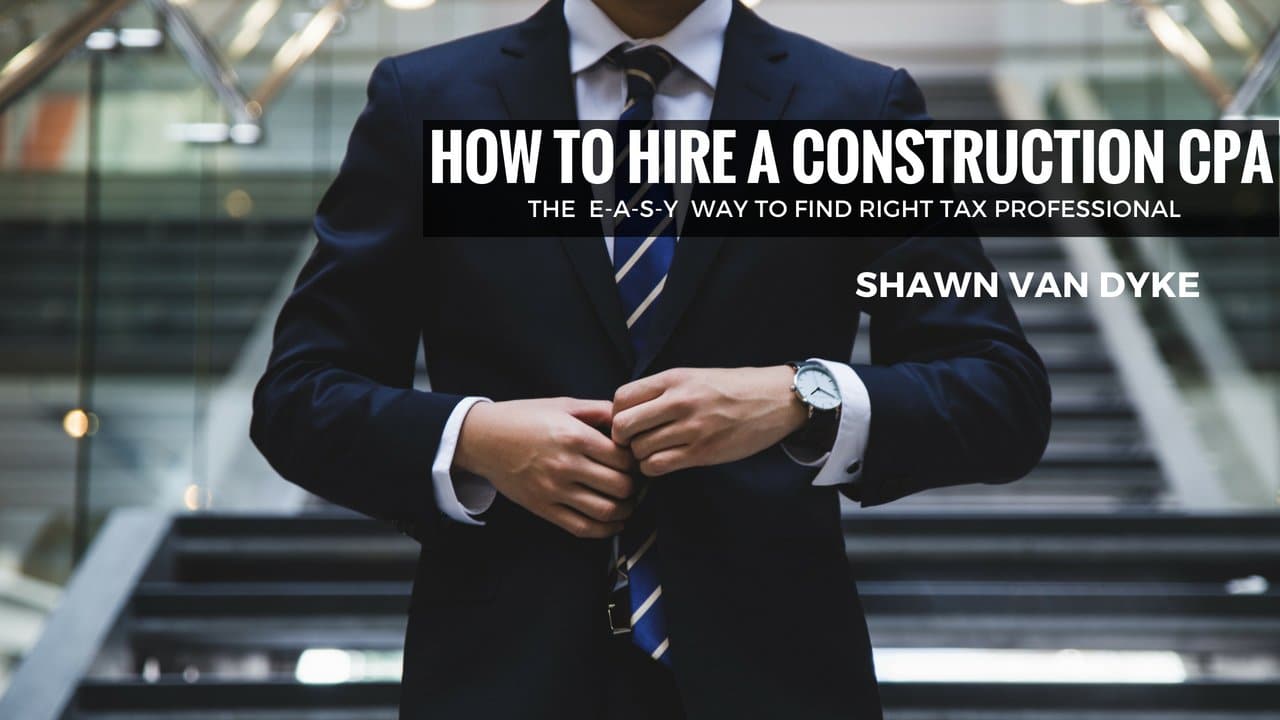Built to Build: Blog
HOW TO HIRE A CONSTRUCTION CPA

Like your customers, homeowners know they need a contractor, but they don’t know exactly what to expect nor what it is that you do. Knowing what to look for in a CPA for your construction business requires that you not only understand your business but also the services you need the CPA to perform.
I once had a client share with me some advice that he had received when he started his construction business.
“Your CPA can only be as good for your business as you are at understanding your business.”
In other words, your CPA works for you. You are the business owner, and you direct the CPA’s scope of work as it relates to the services that you require.
Many construction business owners think they have a financial advisor, business coach, bookkeeper, and tax consultant working for them, when in actuality, all they have is a CPA that has been hired for tax minimization and filing services only. There’s a big difference between a CPA that files your taxes, one that provides you with tax minimization strategies, and one that actually coaches you in running a better business.
In this article, I show you four areas in which to evaluate your CPA (future or current). I call this the EASY way to evaluate your CPA. Each of the letters in the word “EASY” stands for one of the following areas:
E – Expertise
A – Additional Services
S – Simplify
Y – Year-To-Date
The E-A-S-Y Way to Evaluate a CPA
The first area in this evaluation process is to determine if the CPA has “E”xpertise in your type of business. If so, how many construction businesses does the firm serve, and of those businesses, what percentage of those construction businesses are profitable?
Sure, that’s a straightforward question. But don’t you want an expert with a proven track record of helping construction businesses make a profit?
If you’re like many construction business owners, then your books are a mess. No offense.
You want a CPA that is an expert at organizing your accounting system or setting up your accounting system in the best way for your business. And one last note on the area of expertise. If the CPA can’t explain the difference between the COGS and the EXPENSES for a construction company, then you need to find a CPA that can.
That CPA does not have the level of expertise that you need for your construction business.
(Answer: COGS is your cost for the LABOR, MATERIALS, SUBS, and EQUIPMENT that you purchase, markup and sell to your customers. The EXPENSES are everything else.)
Next, the “A” stands for Additional Services.
You want to discuss any Additional Services beyond filing your taxes that the CPA can offer. Many contractors get frustrated with their CPAs because all they get are their taxes filed, an amount to send the IRS, and an invoice for the CPA’s services. The contractor doesn’t get a deeper understanding of why the taxes are what they are and how they can minimize their tax liability.
The truth is that the contractor never hired the CPA to perform those Addition Services and the CPA never sold them to the contractor. Speak with your CPA about the ongoing services she can provide, and I recommend that you hire her to perform those Additional Services.
Here are a few Additional Services I recommend discussing with your CPA:
- Clean-up of accounting system. This is usually a one-time event when you start with a new CPA. She will need to dig into your existing files and “clean up” the mess you or someone else created. Your CPA might not do this work herself, but have a bookkeeper do the clean-up under her direction.
- Monthly check-in. This could be a quick review of the books to ensure that the books are organized correctly and everything is generally in order. Consider it like preventive maintenance on your financial house.
- Quarterly Analysis. This would be a deeper analysis of the numbers for the business and how the profits are shaping up. This will inform you if your quarterly tax payments are in line or need to be adjusted.
- Yearly Filing. This is one service that most CPAs get hired for. If you hire a CPA for the other Additional Services above, you can see that the Yearly Filing should not be a surprise.
Depending on your level of business and tax acumen, you may not require the Additional Services listed above. But until such point that you can predict your taxes without detailed reports from a CPA, then I recommend that you buy Additional Services from your CPA. Don’t be frustrated if all they do is file your taxes when that’s all you hired them to do.
The third area of evaluation of your CPA is the “S” – Simplify.
The federal tax code contains over seventy-three thousand pages. Calculating your tax liability is complicated (to say the least). That’s why you hire a CPA, but the job of your CPA should also be to simplify the process for you.
If your CPA can’t explain how to calculate your taxes, in terms you can understand, then find a CPA that can. When your CPA prepares your tax return, she should also let you know what your quarterly tax payments should be for the coming year. But these “estimated payments” are based on the previous year. If this coming year is better than last year (i.e. you make more profit) then you will owe more taxes. You want a CPA that can help you predict, in general, what your taxes will be each quarter based on the performance of that quarter. You shouldn’t have to worry about the details, but you do need a general strategy and understanding what influences your tax liabilities.
Side Note: Be cautious of CPAs that encourage you to “save on your taxes” by spending money. For example, if your CPA recommends that you buy an asset (like a vehicle) to save on your tax bill, but she hasn’t shown you if you have the cash for such a purchase, then find a new CPA. This CPA is not helping you run a better business. This CPA is only focused on limiting your tax liability. Saving a few thousands of dollars on taxes might be costing you tens of thousands of dollars in profit.
Finally, the right CPA for your construction business should be able to provide you with your “Y” numbers. The “Y” stands for “Year-To-Date.”
You need regular financial reports to monitor the health of your construction business. In my work with clients all over the country, I find that their numbers are being held hostage by the CPA (or bookkeeper). Your CPA should be able to tell you the frequency and content of the financial reports you can expect. Depending on the size and scope of your business, these reports will vary.
I recommend that you ask for a monthly health report from your CPA that includes, but is not limited to:
- Your Profit and Loss Statement
- Your Balance Sheet
- Your Accounts Payable
- Your Accounts Receivable
At a minimum, this is the data that you need to run a construction business. Ask your CPA to include in her services a regular reporting of these numbers and keeping you up-to-date.
SUMMARY
Your CPA is a vital member of your team. You need to interview and evaluate this person the same way you would an employee or subcontractor. You need the right professional to help you move your construction business forward.
Hire a CPA that you can trust and that will enable you to focus on your business.
In the end, it’s the job of the CPA to report the numbers. It’s the job of the business owner to influence the numbers.
If you want to streamline your construction business and DOUBLE your profits next month…

Shawn Van Dyke is a construction industry consultant, business coach, and mentor to skilled trade business owners. He is a Brand Ambassador for Fine Homebuilding, travels across the US as a keynote speaker, seminar presenter, and the author of The Paperwork Punch List: 28 Days to Streamline Your Construction Business.
WANT SHAWN TO SPEAK AT YOUR EVENT OR TRAIN YOUR TEAM?
